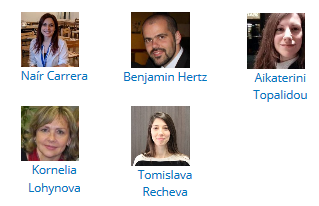Boosting a Sense of Initiative and Entrepreneurship in Your Students
I-LINC

Welcome to the MOOC Boosting a Sense of Initiative and Entrepreneurship in Your Students
On this page
This MOOC’s aim is to train and empower teachers to foster the sense of initiative and the entrepreneurial mindset of their students by developing innovative and creative attitudes and skills.
A sense of initiative and entrepreneurship is the ability to turn ideas into action through creativity, innovation, and risk-taking, as well as the ability to plan and manage projects. It is a key competence that can be developed from primary school to secondary and beyond. It does not necessarily involve a specific school subject. Rather, it requires a way of teaching in which experiential learning and project work have the main role.
This MOOC has been designed with the intention of providing concrete examples for the practical implementation of the Entrepreneurship Competence Framework (EntreComp). Each module consists of several videos, illustrating lesson plans, teaching activities, or possible resources that could enable teachers and educators to strengthen the entrepreneurial skills of their students.
We challenge you to use these resources in your classrooms and nurture your students’ desire to solve problems creatively and to take on opportunities in any social context.
We will be using a variety of online tools and social media to communicate with each other and engage in discussions. Share your ideas about the topic using #entreprecourse.
Learning objectives
- Understanding the importance of fostering a sense of initiative and entrepreneurial mindset in students and pupils
- Exploring the different aspects that entrepreneurial learning covers, and the different areas of applicability (from personal development to active participation in society, to entering or re-entering the job market to starting new professional or personal ventures)
- Engaging in experiential learning and project work
- Learning how to prepare students for entering the job market, and how to provide them with the social and entrepreneurial skills needed
- Becoming familiar with challenge-based learning, by encouraging students to learn while facing real-life problems and situations
- Learning how to bridge the world of education and the world of work
Prerequisites
The course is targeted at primary and secondary school teachers of any subject. VET and further education teachers may also benefit from the course, as well as actors involved in students’ career decisions.
Modules
- Module 1: Engaging Students through Entrepreneurship Education
- Module 2: Enabling Students to Take the Future in Their Hands
- Module 3: Making Good Use of Resources
- Module 4: Achieving Goals by Putting Plans into Action
Certification
You will receive digital module badges for every completed module of the course as well as a course badge and a course certificate upon completion of the full course.
Note to teachers from Portugal: You can get your successful participation in a European Schoolnet Academy course formally recognised as valid continuous professional development, and thereby acquire the relevant number of training hours, by sending your certificate to the Conselho Científico e Pedagógico de Formação Contínua (CCPFC) at Rua do Forno, nº 30, 1º andar - apartado 2168, 4700 - 429 Braga, Portugal. For more information, please contact the CCPFC.
Course Staff

Disclaimer & Copyright
The creation of this MOOC was facilitated by the I-LINC project. I-LINC aims to empower students and young people by creating solutions for boosting their employability and entrepreneurship skills.
Videos illustrating the competences from the Entrepreneurship Competence Framework were produced by European Schoolnet on behalf of the Joint Research Centre, the European Commission’s in-house science service. All videos can be found on the JRC YouTube Channel.

The content of the MOOC (except for videos) has been developed through the I-LINC project. The I-LINC project has received funding from the European Union's Horizon 2020 research and innovation programme under grant agreement No 645909.
All content on this course unless specified otherwise is licensed under a Creative Commons Attribution-ShareAlike 4.0 International License

